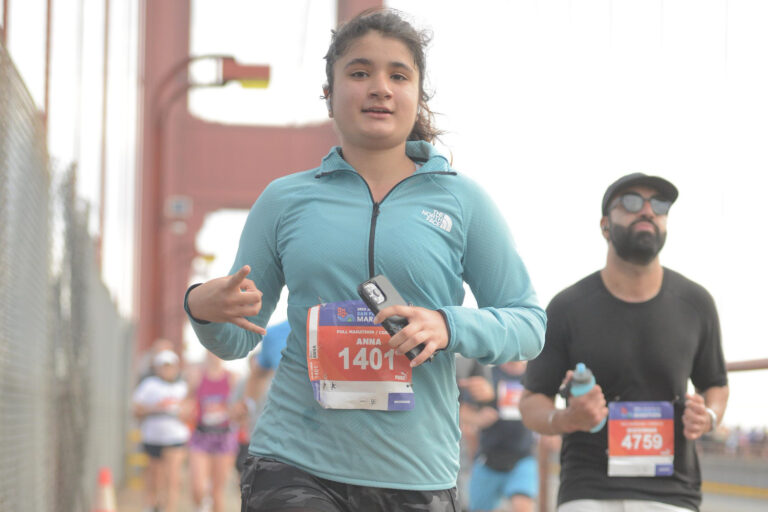Anna Sandhu Explains How Nutrition Fuels Every Runner’s Stride
by Anna Sandhu | Nov 05, 2025
Reviewed by Dr. Arun, M.Pharm., PGDRA, Ph.D.

Every run begins long before your first step. It starts with what you put on your plate. Food is more than fuel, it is the quiet energy that powers every stride, rebuilds every muscle, and keeps your mind focused through each mile.
When I first began learning about wellness, I realized that nutrition is not about strict diets or perfect meals. It is about giving your body what it needs, when it needs it, so you can move, recover, and feel strong in everyday life. Good nutrition is what turns training into progress.
Fuel for Energy: The Power of Carbohydrates

For runners, carbohydrates are like kindling for a steady fire. They break down into glucose, the body’s easiest form of energy. Without enough carbs, your runs can feel heavier, and your pace may drop sooner.
Whole grains, fruits, vegetables, and legumes provide complex carbs that release energy slowly, keeping your endurance steady instead of spiking and fading. A simple pattern helps: include some form of healthy carbohydrate in every meal, and you give your muscles the energy they need to keep moving with rhythm and confidence.
Protein: The Building Block of Recovery
After every run, your body begins quiet repair work. Tiny muscle fibers rebuild and grow stronger, but only if they have the right building blocks. That is where protein comes in.
Lean meats, eggs, beans, lentils, and dairy all offer the amino acids needed to restore muscles. Plant sources such as quinoa, nuts, and tofu also play a big part.
What matters most is timing and balance. A little protein soon after training helps muscles recover faster and reduces soreness the next day.
Healthy Fats: Energy That Lasts Longer
Fats often get misunderstood, but they are essential for runners. They provide a slower, long-burning energy source that supports longer distances. They also help absorb vitamins A, D, E, and K, nutrients that keep bones, skin, and joints healthy.
Avocados, nuts, seeds, and olive oil give that kind of healthy fat naturally. Adding small amounts throughout the day, on toast, in smoothies, or sprinkled over salads keeps energy steady and joints moving smoothly.
Micronutrients: The Small Things That Make a Big Difference
Tiny nutrients have a huge job. Iron carries oxygen to muscles, magnesium helps ease cramps, calcium keeps bones strong, and B-vitamins turn food into usable energy.
For runners, even small gaps in these nutrients can add up to fatigue or slower recovery. Eating colorful fruits and vegetables is one of the simplest ways to fill those gaps naturally. Each color brings something different, greens for iron and magnesium, oranges for vitamin C, purples for antioxidants. A colorful plate is often a balanced one.
Nutrients That Feed the Gut, Fuel the Body
Most people think of food as fuel for muscles, but every nutrient begins its journey in the gut. A healthy gut helps runners absorb what they eat and feel comfortable during training.
Probiotics and prebiotics work quietly to keep that balance. Probiotics found in yogurt, kefir, and fermented foods, add good bacteria to the digestive system. Prebiotics found in bananas, oats, garlic, and asparagus feed those good bacteria so they thrive.
Together, they support smoother digestion, better nutrient absorption, and a calmer stomach during runs. When the gut is balanced, the whole body runs more efficiently literally.
Hydration and Electrolyte Balance
Water is the simplest nutrient of all, yet one of the most powerful. Even mild dehydration can cause fatigue and slower reactions. Runners lose more than water through sweat, they lose electrolytes like sodium, potassium, and magnesium, which help muscles contract and nerves send signals.
Sip water throughout the day, not just during training. Add hydrating foods like oranges, cucumbers, and coconut water to keep balance natural and steady. When runs are long or weather is hot, light electrolyte drinks or salt-balanced snacks can help replace what you lose.
Everyday Eating Rhythm for Runners
Good nutrition works best when there is rhythm. Skipping meals or eating too close to a run can leave you feeling heavy or drained. Instead, aim for small, balanced meals spaced evenly through the day.
A typical pattern that works for many runners:
- A carb-rich snack before running (like fruit or oatmeal)
- A balanced meal with protein and vegetables after
- Steady hydration throughout the day
This rhythm teaches your body to expect and use energy efficiently.
The Quiet Link Between Food and Focus
Nutrition does more than build muscle, it builds mindset. When the body has steady fuel, the mind stays clear, calm, and patient through each mile. Balanced meals can even support better mood and sleep, making recovery more complete.
Running well is about more than motion, when we feed the body well, the mind follows with focus and joy.
Final Reflection: Nourish, Do Not Just Train
Nutrition is the runner’s quiet partner. It supports the heartbeat of every stride, the calm of every breath, and the strength to begin again tomorrow.
Every balanced plate, every glass of water, every mindful choice is a small step toward endurance that lasts. Because real progress is not only measured in miles, it is built meal by meal, bite by bite, from the inside out.
